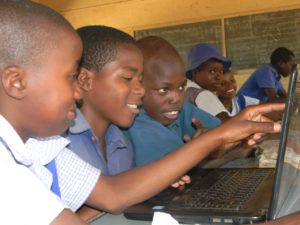
Patrick Gannon, Director of Business Development at BusinessCom Networks, has been involved in data communications and networking since early modems were as big as shoeboxes and cost a dollar per bit. He has deployed a wide variety of networking technologies for leading technology developers, over the last three decades, from Ethernet and Token Ring to FDDI, ATM, SMDS, Frame Relay, MPLS and more. Almost 20 years ago, Pat began deploying broadband satellite solutions, starting with some of the first commercially available two-way systems, for enterprise clients. Today he provides managed broadband satellite services, representing BusinessCom – also an early and highly experienced broadband satellite service provider, to a wide range of enterprise clients, for all sorts of applications.
SpaceWatch Middle East’s Helen Jameson speaks to Patrick about BusinessCom and the company’s work, but with an overall focus on how VSAT services are being used by remote communities including women and children; those affected by war and conflict; about challenges and restrictions and how the Internet is helping to facilitate important dialogue on science and religion.
![]() Tell us about BusinessCom Networks and the companies and organisations you work with.
Tell us about BusinessCom Networks and the companies and organisations you work with.
BusinessCom provides a broad range of broadband satellite services. We are primarily an IP data provider. All of our work is Internet or private network based, although we certainly move voice and video over our networks as well. We sell a wide range of products to a wide range of customers that could be federal integrators, companies that need local Internet access for their own employees, banks or shops that need to communicate with all their branches, humanitarian organisations that are putting up schools or small medical clinics and the mining and drilling industries. Nowadays, almost everybody needs Internet access to some extent, even if it’s nothing more than keeping the workers happy when they’re offsite at the job. With regards to many of the organisations that support children, via health care, education, etc. we offer a discount to these organisations to help them cover some of the costs.
How are VSAT services being used to assist communities, and especially children, in the regions you serve?
A number of our sites are educational such as small schools, clinics or community cybercafés that everyone in the community can use. The biggest impact that this technology brings with it is education. If you can connect children up to the Internet, they have access to the rest of the World. They have access to education and can learn about how other kids in other regions live and what they do. They can be presented with the same kind of educational tools that others have available to them. The way things are going, it looks like it will just be a matter of time until all education will be IP or Internet-based. Our whole way of life has changed. In the old days, there was a central authority that communicated to a group of kids or a religious leader to a group of believers or a government to a group of citizens. However, today, with access to the Internet, it has become a scenario of ‘any to any’ and ‘many to many’, and we are moving away from central authority.In getting these kids active on the Internet, they are being given the opportunity to put across their views and have their own voice matter just like anybody else’s.

Can you tell us more specifically about the work that you are doing with War Child in the Central African Republic?
War Child is an organisation that aims to support children affected by war and empower them to develop their potential and have a real chance at a better future. The team works towards a world where no child’s life is torn apart by war.
BusinessCom, with its local partner, Vision Plus, is working with War Child in the Central African Republic (CAR) to deploy Internet services via VSAT to Bangui, the capital of CAR. BusinessCom is leveraging its extensive expertise in the field of VSAT to deliver critical connectivity to communities of children whose lives have been affected by war. As part of the company’s Corporate Social Responsibility (CSR) program, BusinessCom is covering part of the service cost for War Child as the company recognises the hugely significant impact that access to Internet services can bring to children and young people.
Using the VSAT systems and services delivered by BusinessCom and Vision Plus, War Child is able to establish access to a wide range of tools that can enable its youngsters to benefit from education, from connection to friends and relatives and to the plethora of new opportunities opened up by ICTs.
Can you tell us about your Sentinel device and how it can help organisations in more remote regions to get the most out of the VSAT services you deploy?
We are unique, I believe, in offering our tool called Sentinel which has a couple of important features that help network users. It provides optimisation and compressionon both the download and upload. If you have a school that is doing a lot of web access for example, we have the ability to significantly compress the content. We can even degrade the picture quality to save bandwidth. That makes it easier for these people to participate because satellite technology is, unfortunately, more expensive than ground-based services. However, in many places, that’s the only option, and being able to offer more bandwidth over the circuit gives them better value for their dollar and makes it easier for them to get more use out of their service. Sentinel also gives our clients outstanding diagnostics and troubleshooting tools, enabling remote support from our NOC (Network Operations Center), as we are there to help them when there is a problem.Few of these clients have trained IT staff on site. We can take over and configure the network and offer assistance with the overall management of the network, including the ability to prioritise their most important traffic, provide WiFi access, firewall and other security, as well as all the standard router features required to run a typical remote network.
What impact do ITAR restrictions have upon the extent to which you can provide VSAT services to certain war torn regions?
There are some areas where we simply cannot participate. The U.S. has restrictions on selling U.S. technology and – let’s face it – much of the leading technology is U.S.- based these days. But there are restrictions that are placed on countriesthat have been identified as terrorist nations and that includes Syria, Iran, Sudan and North Korea, for example. And that is a challenge because we get leads from those countries and I have mixed feelings because I think it would be good to present them with a service because the more contact that they have with the outside world, the better it probably is for everybody. However, the U.S. government does not want technology falling into the hands of people who may want to use that satellite service for nefarious purposes. So, there’s really nothing we can do in those countries. In other places that are nearby or have a lot of local strife or are considered terrorist countries, we use local installers. This is helpful for the locals because it provides income for the guy who does it. But it also means you have someone there who can go onsite and who understands the situation, who knows the people who are living there. The people having the systems installed generally do not have the knowledge to do it themselves and it’s a real positive that we can almost always get an installer to help. In some war torn areas such as Iraq, that can be a challenge. But generally, we can get an installer out there and as long as the installer can align the antenna and plug in the Sentinel device, we can take over from there. We can remotely manage and configure their entire network. We can troubleshoot it and help them to prioritise important traffic over unimportant traffic, make VoIP work, and do it all remotely.
How does BusinessCom overcome challenges presented in deploying VSAT networks to communities affected by war?
Selling into some of these war-torn countries can be challenging. I used to get requests from Iraq before they went on the approved list and I still get requests from Iran.
One of my customers had a cybercafé in Somalia and he accidently sent me an email that he didn’t mean to copy me in which displayed a video of a U.S. personnel carrier being blown up by IEDs. It was shocking to see that people in a cybercafé were having a chuckle over seeing Americans being attacked. The bottom line is that we don’t know what a service is going to be used for by the people we sell it to. We have had experiences of cybercafés that were blown up when the local militia didn’t like the idea of the residents having access to the outside world so they removed it, along with the owner of the cybercafé. Things like that can happen. Mostly it’s an issue of logistics. If you are going into a country like Afghanistan or Iraq, make sure that you can get an installer who can get into those sites to set up the service. If it’s an NGO or someone doing humanitarian work, they have sometimes done this a couple of times and will do their own installations and have that capability. We work closely with them to understand their capabilities. We can talk most people through an installation on the phone if they have at least some basic understanding.

We have talked about how VSAT services can transform young peoples’ lives, but what about the broader community too?
I am a big fan of the plan to empower women. Instead of just handing people money, you give them a micro-loan which is enough to start a small business weaving baskets, making jewellery, making rugs and then train then to use the Internet to sell their products to another market. I think that is a wonderful fit for the humanitarian effort and communications. The problem in many of these countries is that women are property to all intents and purposes, and the only way to change that is through education and the ones to initiate that change are the boys. You have to teach the boys how to treat women, and the best ones to do this are probably their mothers.
How do you see communications technology such as VSAT having a positive impact on what is ultimately war brought about by differences in religious ideologies?
Allow me to preface this by saying this is my opinion, and not necessarily that of all BusinessCom. I think it is already helping. It illustrates to many people who would never have considered it before that it is okay to criticise a religion or a religious authority. When I was a kid back in the 50s and 60s, you did not criticise religion. That was completely off the table. But today, it’s very widespread. We can see this clearly in the U.S. and in Europe. In the U.S., the main denominations are losing the youth at a rapid rate and the Internet has to be playing a role in that. They can now read about the fact that there was no 6 day creation, there was no global flood, no 2 person DNA bottleneck. Those and other things described in the Abrahamic texts never happened, so if they never happened where is the foundation? There is much to discuss! People can look at this evidence and draw their own conclusions and then communicate it with their peers. It means more coming from one kid to another kid than from an adult teacher. The ‘many to many’ education that comes from the Internet is transforming opinion. There is certainly a lot of misinformation, but there is also very valuable information being shared too. The battle between science and religion rages on, across the Internet – and this is a very important global conversation we need to have. We bring to everyone the opportunity to engage in that conversation, regardless of location. What progress ever occurs without a conversation?
SpaceWatch Middle East thanks Patrick Gannon, Director of Business Development at BusinessCom Networks, for the interview.
Original published at: https://spacewatch.global/2017/06/spacewatchme-interviews-pat-gannon-of-businesscom-networks/
 SpaceWatch.Global An independent perspective on space
SpaceWatch.Global An independent perspective on space

